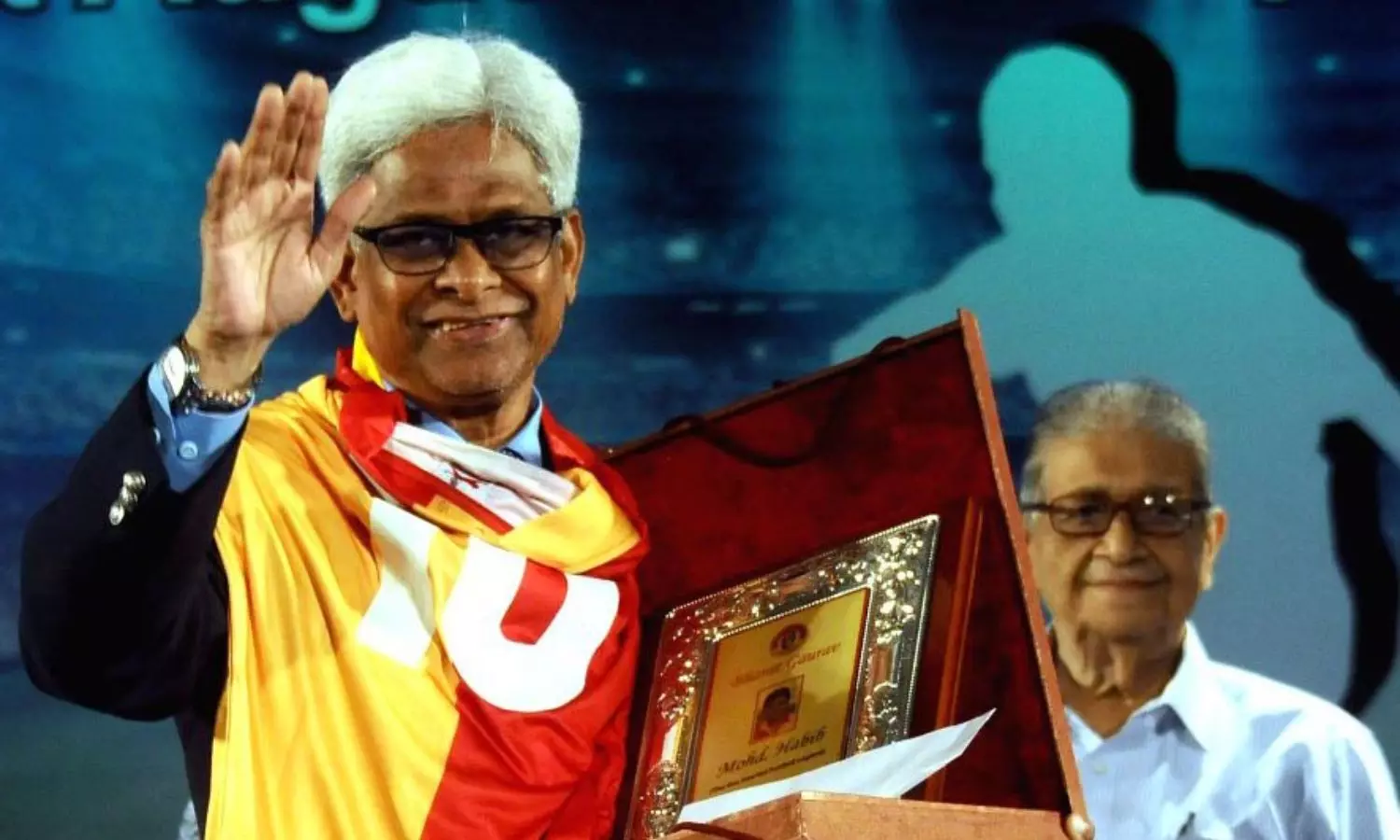Football
Mohammed Habib, the footballer praised by Pele, passes away
Habib, an excellent attacking midfielder in his playing days who dazzled the crowd in the 1970s and 1980s, had been suffering from dementia and Parkinson’s disease for the last few years.

(FILE PHOTO) Footballer Mohammed Habib at an event in Kolkata organised by East Bengal.
Kolkata: Mohammed Habib, the 'Bade Miyan' of Indian football, passed away on Tuesday at his Hyderabad residence. He was 74 and is survived by his wife and three daughters.
Habib, an excellent attacking midfielder in his playing days who dazzled the crowd in Kolkata in the 1970s and 1980s, had been suffering from dementia and Parkinson’s disease for the last few years.
Habib, who represented India between 1965 and 1976, was part of the national team that won the bronze medal at the 1970 Asian Games in Bangkok, Thailand, led by his fellow Hyderabadi Syed Nayeemuddin.
'Terrorised the defenders'
"He was one of the finest strikers. He scored so many goals. He went to Calcutta and played for East Bengal and terrorised the defenders. He established his name as a legend of the game there," Nayeemuddin told The Bridge over the phone from Hyderabad.
Appeared as a 17-year-old tiny teen for East Bengal in Kolkata in 1966, Habib made his mark in his very first match itself. He notched up a brace and had three assists to the Red and Gold brigade's 7-0 rout of Sporting Union. Habib ended his career with 113 goals for East Bengal, the fourth-highest in the club's all-time tally. He also had the distinction of scoring the winning goals in three Durand Cup finals in the span of seven seasons for the Kolkata club.
Habib, the former India skipper, made his India debut in 1967 against Thailand in the Merdeka Cup, and he represented the country in 35 matches, scoring 11 goals in the process. Apart from the Asiad bronze medal, Habib was instrumental in India's Pesta Sukan Cup win, an honour they shared with South Vietnam in 1971.
But Habib's captain of the 1970 Asiad, Nayeemuddin, lamented that his teammate had a miserable end.
"Now, he passed away, he will be in the spotlight, but when he was alive nobody bothered about him. But he deserved affection and care. The federation (AIFF) never looked after him. When I visited him a couple of years back, he was speaking in low tones. Even if he was given a wheel chair, he could see the field again. He might also relieve memories of his playing days," added Nayeemuddin.
Habib, who was swift and quick in the attacking third, also had the distinction of earning an accolade from legendary Pele when he turned up for Mohun Bagan in the historic match against Cosmos Club in 1977. Habib scored a goal and provided a crucial assist to his brother Akbar's strike, which enabled Mohun Bagan to take a 2-1 lead. The match ended in a 2-2 draw.
Such an effective, tenacious and skilful ball player Habib was that the fans, fond of his enchanting skills, named him "Bade Miyan" and his brother Akbar "Chhote Miyan" in Kolkata Maidan.
Habib, who became a starlet in the eyes of Kolkata fans, also had the distinction of playing for the Big 3 of the city - East Bengal, Mohun Bagan and Mohammedan Sporting - in his 18-year-long career and won more than 50 trophies in domestic football.
Although he hailed from Andhra Pradesh, Habib plied his trade for Bengal in the Santosh Trophy when he was in Kolkata, playing for clubs in the eastern metropolis. In 1969, he raided the Services defence to score five goals in Bengal's 6-1 win in the final.
Retired in the mid-1980s, Habib also played a key role in forming the Tata Football Academy, which would prove to be a boon for Indian football, producing so many top-notch talents in later years.
Habib - The trailblazer
Habib's work rate, professionalism and style had an immense impact on his immediate next generation of players.
Victor Amalraj, who hailed from neighbouring Secunderabad and idolised Habib, said, "He was a hard-working midfielder who would transform into a striker with a quick movement. What impressed me about his game was his fighting spirit. He would fight till his last ounce of energy. He never wanted to lose a match. He would look for a goal even when the game was on the cusp of getting over. Because of this attitude, he scored many late goals and switched the luck for his team. Such players are rare."
"I was very close to him and his brother Akbar. I played with him at Mohammedan Sporting and East Bengal. Today afternoon his wife called me and gave me the news of his demise. He was my captain at Mohammedan Sporting in 1979," added Amalraj.
Amalraj also called Habib a trailblazer in Hyderabad football for bringing discipline and professionalism to the game.
"Habib bhai was the first footballer who brought the discipline to Hyderabad football which is widely apparent in modern football. He had no-nonsense attitude. For us, Hyderabadis, he was the first professional footballer when football was still in ameature stage in India. Even when he was in Calcutta, he never retained his allegiance for one club. He knew his worth and changed clubs at his convenience, and nobody could point a finger against him. He switched clubs and returned to it at his will and was dedicated to them where he played. I learned from him how and when to switch clubs," recounted Amalraj.
